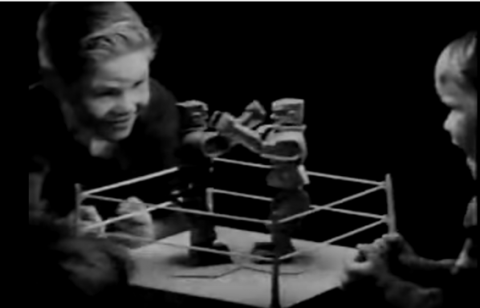Eve and an Easy Bake Oven: On "Jewish Paideia in the Age of Enlightenment"
Jewish Quarterly Review volume 106, number 3 (summer 2016)
Americans of a certain age may remember Rock ‘Em Sock ‘Em Robots—introduced in 1964, the game set stiff plastic pugilists face to face in a small boxing ring. They were controlled by buttons that unleashed rudimentary uppercuts and jabs; if a plastic fist managed to connect, the head of the opposing robot would pop up. Round won.
It was a toy that no parent really wanted their kids to have. But then again, nearly all toy marketing before then was aimed at adults; toys themselves likewise replicated adulthood in whimsical or didactic miniature, from dolls and easy bake ovens, which made girls into wee wives and mothers, to superhero costumes meant to direct the young man’s leisure imagination. Yet while the wisdom in the biz said it could not sell, Rock ‘Em Sock ‘Em was a wild success, managing to detach millions of dollars from post-war wallets. How?

This game's maker changed the industry—as it was reported to me—by leapfrogging the parent and speaking directly to the child. The earliest ads were stripped of any hint of a domestic sphere, no mother smiled benignly on, and no world-saving heroism or virtue justified the blows the boys rained on each other’s robot. It was kid catnip.
In 1964, the American toy industry discovered children.
It is from this child-centered vantage that we follow our authors in this forum backward. Dorothea Salzer, Iris Idelson-Shein, and, Andreas Brämer remind us that, like children’s toys (or, more pertinently in this case, the advertising of children’s toys), children’s literature and education policy have a traditionally had little to do with actual children. They have been parts of a system driven by a range of interests beginning from a high minded concern for education that, when scratched, reveals a range of less-visible interests and framing paradigms, stretching from—as we see in the essays in this forum—apologetics to polemics, reformist to reactionary ideals, political to religious agendas, economic to philosophical priorities. The children at the crosshairs of education reform, children’s literature, and paideia in general, were not in fact children at all. They were ciphers—rudimentary clay humans: little Jews and proto-citizens, baby workers and wives—being asked to serve distinctively adult agendas for social reform or preservation.
As such, education is a useful tincture with which to reveal the dominant stressors and concerns of society at a given moment. Given that education is how societies make the citizens they most need or desire, we can also see in it in nuce the ideals and aspirations of the culture that produces educational theories, materials, and policies. The Haskalah proves an especially rich terroire for changing and dynamic education theory, law, and literature; the special section of this issue walks through 6 enlightening case studies. It is introduced by coeditor David Myers, whose essay is available here.
